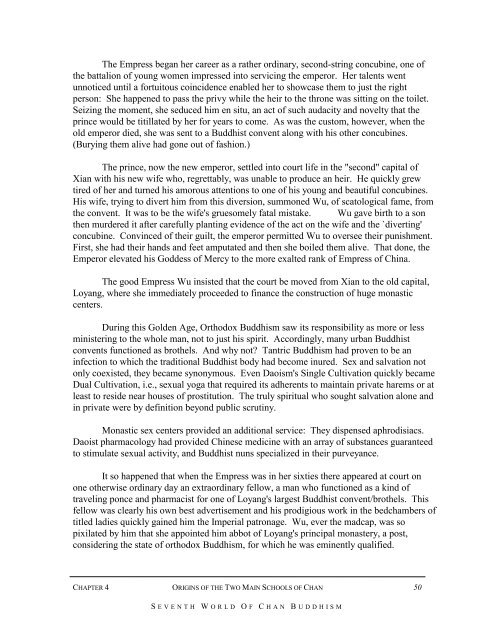seventh world of chan buddhism - Zen Buddhist Order of Hsu Yun
seventh world of chan buddhism - Zen Buddhist Order of Hsu Yun
seventh world of chan buddhism - Zen Buddhist Order of Hsu Yun
You also want an ePaper? Increase the reach of your titles
YUMPU automatically turns print PDFs into web optimized ePapers that Google loves.
The Empress began her career as a rather ordinary, second-string concubine, one <strong>of</strong><br />
the battalion <strong>of</strong> young women impressed into servicing the emperor. Her talents went<br />
unnoticed until a fortuitous coincidence enabled her to showcase them to just the right<br />
person: She happened to pass the privy while the heir to the throne was sitting on the toilet.<br />
Seizing the moment, she seduced him en situ, an act <strong>of</strong> such audacity and novelty that the<br />
prince would be titillated by her for years to come. As was the custom, however, when the<br />
old emperor died, she was sent to a <strong>Buddhist</strong> convent along with his other concubines.<br />
(Burying them alive had gone out <strong>of</strong> fashion.)<br />
The prince, now the new emperor, settled into court life in the "second" capital <strong>of</strong><br />
Xian with his new wife who, regrettably, was unable to produce an heir. He quickly grew<br />
tired <strong>of</strong> her and turned his amorous attentions to one <strong>of</strong> his young and beautiful concubines.<br />
His wife, trying to divert him from this diversion, summoned Wu, <strong>of</strong> scatological fame, from<br />
the convent. It was to be the wife's gruesomely fatal mistake. Wu gave birth to a son<br />
then murdered it after carefully planting evidence <strong>of</strong> the act on the wife and the `diverting'<br />
concubine. Convinced <strong>of</strong> their guilt, the emperor permitted Wu to oversee their punishment.<br />
First, she had their hands and feet amputated and then she boiled them alive. That done, the<br />
Emperor elevated his Goddess <strong>of</strong> Mercy to the more exalted rank <strong>of</strong> Empress <strong>of</strong> China.<br />
The good Empress Wu insisted that the court be moved from Xian to the old capital,<br />
Loyang, where she immediately proceeded to finance the construction <strong>of</strong> huge monastic<br />
centers.<br />
During this Golden Age, Orthodox Buddhism saw its responsibility as more or less<br />
ministering to the whole man, not to just his spirit. Accordingly, many urban <strong>Buddhist</strong><br />
convents functioned as brothels. And why not? Tantric Buddhism had proven to be an<br />
infection to which the traditional <strong>Buddhist</strong> body had become inured. Sex and salvation not<br />
only coexisted, they became synonymous. Even Daoism's Single Cultivation quickly became<br />
Dual Cultivation, i.e., sexual yoga that required its adherents to maintain private harems or at<br />
least to reside near houses <strong>of</strong> prostitution. The truly spiritual who sought salvation alone and<br />
in private were by definition beyond public scrutiny.<br />
Monastic sex centers provided an additional service: They dispensed aphrodisiacs.<br />
Daoist pharmacology had provided Chinese medicine with an array <strong>of</strong> substances guaranteed<br />
to stimulate sexual activity, and <strong>Buddhist</strong> nuns specialized in their purveyance.<br />
It so happened that when the Empress was in her sixties there appeared at court on<br />
one otherwise ordinary day an extraordinary fellow, a man who functioned as a kind <strong>of</strong><br />
traveling ponce and pharmacist for one <strong>of</strong> Loyang's largest <strong>Buddhist</strong> convent/brothels. This<br />
fellow was clearly his own best advertisement and his prodigious work in the bedchambers <strong>of</strong><br />
titled ladies quickly gained him the Imperial patronage. Wu, ever the madcap, was so<br />
pixilated by him that she appointed him abbot <strong>of</strong> Loyang's principal monastery, a post,<br />
considering the state <strong>of</strong> orthodox Buddhism, for which he was eminently qualified.<br />
CHAPTER 4 ORIGINS OF THE TWO MAIN SCHOOLS OF CHAN<br />
S EVENTH W ORLD O F C HAN B UDDHISM<br />
50


